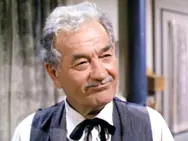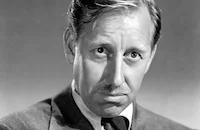Black Tuesday
Brief Synopsis
Cast & Crew
Hugo Fregonese
Edward G. Robinson
Jean Parker
Peter Graves
Milburn Stone
Warren Stevens
Film Details
Technical Specs

Synopsis
After the governor refuses to stay his execution, notorious racketeer Vincent Canelli begins to plot an escape. Also sentenced to die is bank robber-police killer Peter Manning, who has turned down the governor's offer to delay his execution for ten days if he reveals where he hid the $200,000 he stole during his last robbery. Although Manning does not like Canelli, they both denounce the justice system that has condemned them to die on "Black Tuesday," the day when the prison sends inmates to the electric chair. The night before their scheduled executions, Canelli's girl friend, Hatti Combest, and his right-hand man, Joey Stewart, kidnap Ellen, the daughter of prison guard John Norris, and convince him that they will kill her if he does not help them. The following day, as Norris tapes a gun under one of the seats in the execution chamber's witness room, neophyte reporter Frank Carson takes a bus to the prison to cover the executions. When he disembarks, Joey and his men abduct Frank, then Joey, disguised as Frank, enters the prison. After Canelli is led into the chamber, Joey pulls the hidden gun and shoots Norris and a prison official. Canelli then frees Manning and three other prisoners, and after equipping them with guns, takes Father Slocum, prison doctor Hart and prison guard Lou Mehrtens hostage. More guards are killed as the gang makes it to their getaway car, a large van, and Manning is seriously wounded. After Canelli stops the van and orders out the other three prisoners, whom he hopes will distract the police, the van drives into a large moving truck and is taken to a multi-story warehouse. There, Canelli embraces Hatti, who is the only person he trusts, and the hostages are herded together with Frank, Ellen and an airplane pilot who has also been abducted. Canelli plans to force Manning to reveal the location of his loot, then use a waiting plane to fly to safety with Hatti. Fearing that Manning will die, Canelli orders Hart to save him or be killed himself, and so Hart removes the bullet lodged deep in the unconscious Manning's chest. Ellen, who has learned from Father Slocum that her father is dead, is ordered to nurse Manning, and when he revives the following morning, she tells him that she hates him. Canelli then orders Manning to reveal the location of his money, and when Manning laughingly states that it is in a safe-deposit box requiring his signature, Canelli beats him into unconsciousness. Later, Frank tells Ellen that the other three convicts have been killed and when Ellen expresses a grim satisfaction, Manning tells her that every man wants to live for as long as he can, no matter what society thinks of him. Manning does apologize for Norris' death, however, and tells Ellen what a kind man her father was. Determined to get his loot, Manning, accompanied by Hatti, goes to the bank, but as they are leaving, begins to faint and attracts the attention of the bank guard. The guard recognizes him from the morning newspaper, and soon the police have followed the gang to the warehouse and surrounded the building. A shootout ensues, and Canelli orders Father Slocum to write a letter detailing his demands. When the priest refuses, Canelli threatens to shoot him, Frank intervenes. Canelli then slugs and shoots Frank, and Hatti, hoping to stop Canelli from killing the reporter, writes the letter, in which Canelli demands that the police leave or he will murder the hostages one by one. Police inspector Hailey wrestles with his conscience and decides that he cannot "make deals with killers," even if it results in the deaths of the hostages. Hart tends to Frank, of whom Ellen has become fond, and states that he will die within a few hours if he is not taken to a hospital. Recognizing Ellen's feelings, Manning persuades Canelli not to select Frank as the first to die, and, wildly declaring that he will show "you fine citizens" how far a man will go to stay alive, Canelli shoots Mehrtens. Soon after, Joey is killed by a machine-gun, and Hatti is also killed by a ricocheting bullet. Grief-stricken, Canelli asks Father Slocum to perform the last rites for Hatti, then kills one of his own men who wants to surrender. Ellen begs Manning to help Frank, but Manning refuses to surrender, despite her offer to plead his case with the police. Canelli then selects Father Slocum to be the next hostage to die, but Hart tells him that he should kill Frank instead, as he will die anyway without medical attention. Pulling his gun, Canelli attempts to decide between his victims, and when Ellen throws herself onto Frank, Manning shoots Canelli in the back and kills him. Unwilling to return to prison, Manning then yells at Hailey that he is coming out with a gun in his hand, and after he exits, Ellen cries when she hears the hail of gunfire.

Director
Hugo Fregonese
Cast

Edward G. Robinson

Jean Parker

Peter Graves

Milburn Stone

Warren Stevens
Sylvia Findley

Jack Kelly
Hal Baylor
James Bell

Russell Johnson

Frank Ferguson
Harry Bartell
Simon Scott

Phil Pine

Paul Maxey
William Schallert
Don Blackman
Dick Rich
Edmund Cobb
Jim Bacon
Crew
Sydney Boehm
Hilyard Brown
Jerry Bryan
Stanley Cortez
Paul Dunlap
Robert Golden
Leonard Goldstein
Robert Goldstein
Tom Lambert
Gus Norrin
Bob Parrish
Al Spencer
Sam Wurtzel
Sam Wurtzel

Film Details
Technical Specs

Quotes
Trivia
Notes
Although Hollywood Reporter news items include the following actors in the cast, their appearance in the completed film has not been confirmed: Than Wyenn, Lee Aaker, Ray Bennett, David Bond, John Close, Joe Bailey, Herold Goodwin, Joe Kerr, Richard Cutting, Joey Ray, Rex Dominick, John Halloran, Michael McHale, Wesley Hudman and John Phillips.
According to the Motion Picture Herald Prod Digest review, this film was "the first United Artists release under that company's agreement with the late Leonard Goldstein's independent production unit, now under the command of Robert Goldstein." Several reviewers commented on the film's grimness and brutality, and according to a January 1955 Daily Variety news item, the picture was banned by the Memphis Censor Board. The Hollywood Reporter review noted that the film was shot with Eastman Tri-X film, a new, faster stock requiring less light.












